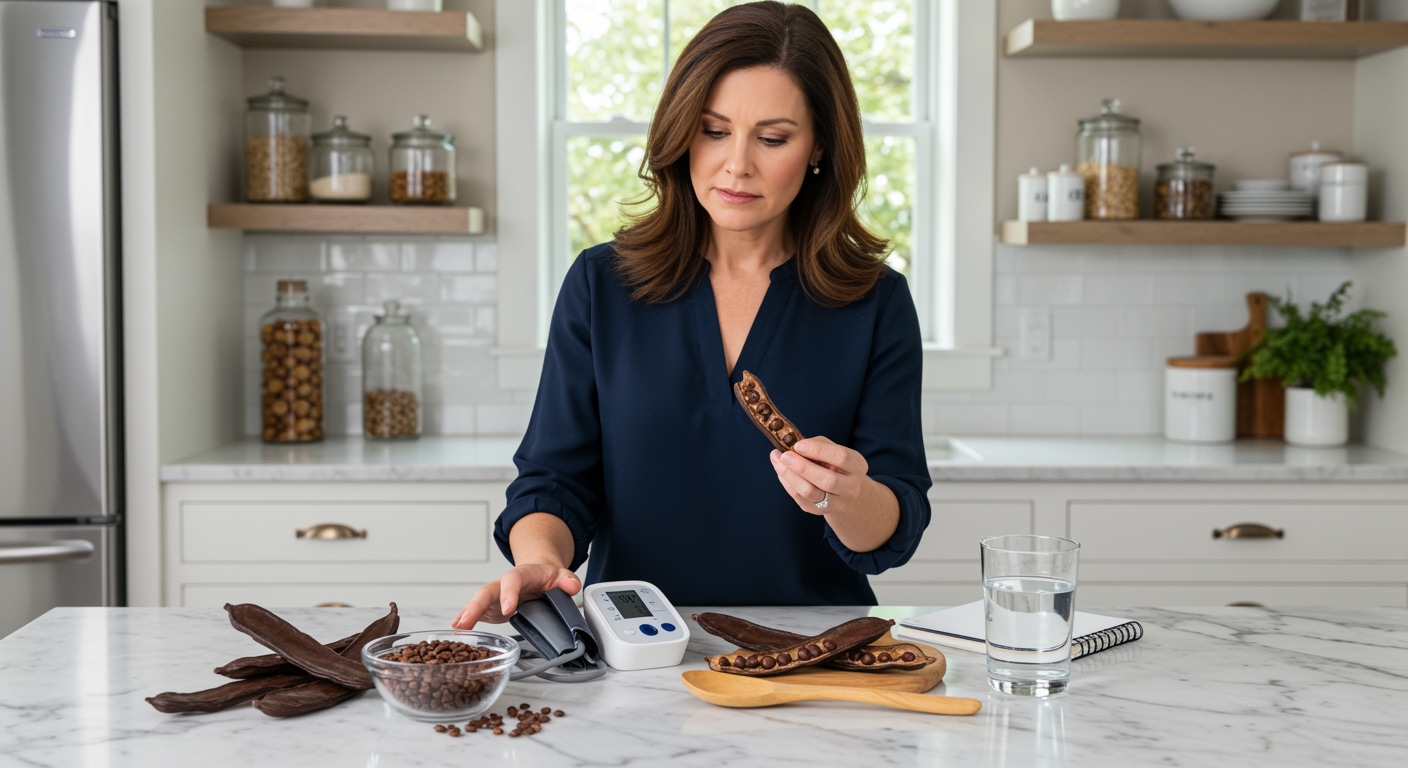✪ Key Takeaway: Low blood pressure patients should use carob seeds cautiously as they may further reduce blood pressure levels.
Introduction
Your friend just recommended carob seeds as a healthy chocolate alternative, but you have low blood pressure and wonder if they are safe for you.
Many people with hypotension worry about foods that might drop their blood pressure even lower, especially when trying new health foods that seem too good to be true.
Hi, I am Abdur, your nutrition coach and today I am going to explain whether low blood pressure patients should avoid carob seeds and what you need to know about their effects on circulation.
What Are Carob Seeds And How Do They Affect Blood Pressure?
Carob seeds come from the carob tree pods and contain unique compounds that can influence your cardiovascular system in ways you might not expect.
These seeds contain natural polyphenols and fiber compounds that research shows can have mild blood pressure lowering effects through several mechanisms.
The soluble fiber in carob seeds helps improve blood vessel function by promoting better nitric oxide production, which naturally relaxes blood vessels.
Studies indicate that carob extract can reduce both systolic and diastolic blood pressure readings by approximately 3-5 mmHg in some individuals.
For someone with normal blood pressure, this reduction might be beneficial, but for those with hypotension, it could push readings into dangerously low territory.
The blood pressure lowering effect typically occurs within 2-4 hours after consumption and can last for several hours depending on individual metabolism.
✪ Fact: Carob seeds contain more fiber per gram than most other seeds, which contributes to their blood pressure effects.
What Symptoms Should You Watch For?
Low blood pressure patients who consume carob seeds should monitor for specific warning signs that indicate their blood pressure has dropped too low.
Dizziness when standing up quickly is often the first sign that carob seeds have lowered your blood pressure beyond safe levels.
You might experience lightheadedness, especially during the first few hours after eating carob seeds or products containing them.
Unusual fatigue or weakness that seems disproportionate to your activity level can indicate that your blood pressure has dropped significantly.
Some people report feeling confused or having difficulty concentrating when their blood pressure drops too low after consuming carob.
Cold hands and feet, along with pale skin, are physical signs that your circulation has been compromised by excessively low blood pressure.
✪ Pro Tip: Keep a blood pressure log when trying carob seeds to track how your body responds over several days.
How Much Carob Is Safe For Hypotension Patients?
The safe amount of carob seeds for low blood pressure patients depends on your baseline readings and individual sensitivity to dietary changes.
Most nutrition experts recommend starting with no more than one teaspoon of ground carob seeds per day if you have hypotension.
This small amount allows you to gauge your body’s response without risking a dangerous drop in blood pressure levels.
Wait at least 48 hours between doses when first testing carob seeds to understand how long the effects last in your system.
If your systolic blood pressure is below 100 mmHg or diastolic is below 60 mmHg, you should avoid carob seeds entirely until your readings improve.
Always consume carob seeds with food rather than on an empty stomach, as this can help moderate the blood pressure lowering effects.
✪ Note: Commercial carob products often contain concentrated amounts that may be stronger than whole seeds.
What Are Better Alternatives For Low Blood Pressure Patients?
Low blood pressure patients seeking chocolate alternatives have several safer options that will not further reduce their circulation.
Cocoa powder in small amounts can actually help maintain blood pressure levels due to its natural caffeine content and different compound profile.
Raw cacao nibs provide chocolate flavor without the blood pressure lowering effects found in carob, making them a safer choice for hypotension.
Dates and figs offer natural sweetness and can help maintain stable blood sugar, which supports healthy blood pressure levels.
Small amounts of dark chocolate with at least 70% cacao content may actually help support circulation without the risks associated with carob.
These alternatives provide similar nutritional benefits without the specific compounds in carob that can problematically lower blood pressure in sensitive individuals.
✪ Pro Tip: Focus on foods that naturally support blood pressure like salted nuts and adequate hydration instead.
The Bottom Line
Low blood pressure patients should approach carob seeds with significant caution due to their proven ability to lower blood pressure further.
When your blood pressure is already low, every food choice becomes a health decision that requires careful consideration.
I would love to hear about your experiences with carob seeds or any questions you have about managing low blood pressure through nutrition in the comments below.
References
At NutritionCrown, we use quality and credible sources to ensure our content is accurate and trustworthy. Below are the sources referenced in creating this article:
- Nutraceutical Business Review: Study Reveals Effects of Carob Extract on Cardiometabolic Alterations
- Vinmec: Diet for People with Low Blood Pressure
- PMC: Carob Research Study
- Healthline: Carob Powder Nutrition and Benefits





